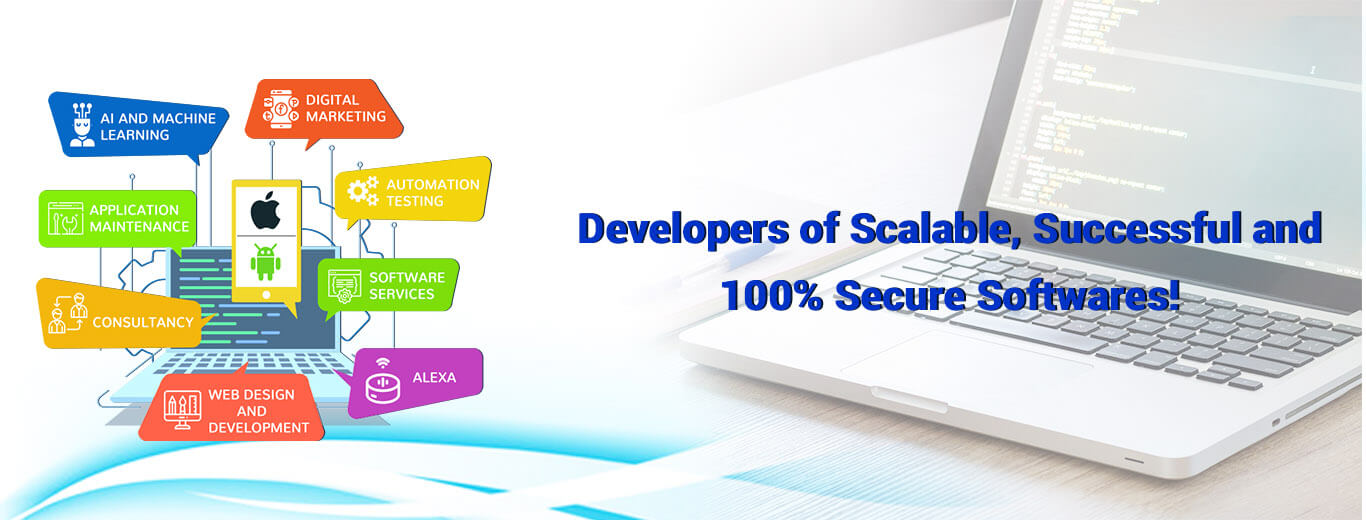In recent years, Artificial Intelligence (AI) has moved from being a futuristic concept to an integral part of everyday applications. From healthcare and finance to e-commerce and entertainment, AI is reshaping how applications are developed, function, and interact with users. The integration of AI in application development has opened up new possibilities for creating smarter, faster, and more personalized digital experiences.
In this blog, we’ll explore how AI is revolutionizing application development, its benefits, practical use cases, and what the future holds.
What is AI in Application Development?
Artificial Intelligence refers to the simulation of human intelligence in machines that are programmed to think and learn. In the context of application development, AI involves embedding intelligent functionalities into applications, allowing them to make decisions, predict outcomes, and improve over time without explicit programming.
AI technologies commonly used in applications include:
- Machine Learning (ML)
- Natural Language Processing (NLP)
- Computer Vision
- Speech Recognition
- Predictive Analytics
These technologies enable apps to perform tasks such as recognizing images, processing speech, predicting user behavior, and offering personalized recommendations.
How AI is Transforming Application Development
1️⃣ Enhanced User Experience (UX)
AI has dramatically improved how users interact with applications. Features like voice recognition, chatbots, personalized suggestions, and real-time assistance enhance user engagement and satisfaction. Applications can now learn from user behavior and preferences, offering tailored experiences that feel intuitive and efficient.
For example:
- Streaming apps like Netflix or Spotify use AI algorithms to recommend movies and songs based on your listening or viewing habits.
- E-commerce apps suggest products you might like, using AI to analyze your past searches and purchases.
2️⃣ Automating App Development Processes
AI is not just enhancing applications — it’s also streamlining the development process itself. AI-powered tools and frameworks can:
- Automatically generate code snippets
- Perform software testing and bug detection
- Optimize application performance
This reduces development time, minimizes human error, and helps developers focus on innovation rather than repetitive tasks.
3️⃣ Smarter Decision-Making Capabilities
Applications equipped with AI can analyze vast amounts of data, identify patterns, and make data-driven decisions. In industries like healthcare, finance, and logistics, this capability can be a game-changer.
For instance:
- Health apps can predict potential health issues based on user data.
- Financial apps can detect fraudulent transactions in real-time using AI algorithms.
- Logistics applications can optimize delivery routes based on traffic and weather data.
4️⃣ Advanced Security and Threat Detection
Cybersecurity is a major concern for application developers. AI can bolster app security by detecting suspicious activities, preventing data breaches, and responding to threats instantly. AI systems can analyze usage patterns and identify anomalies, offering better protection against hacking and fraud.
5️⃣ Natural Language Interfaces
With the rise of virtual assistants like Siri, Alexa, and Google Assistant, AI-powered voice and text interfaces have become increasingly popular. Natural Language Processing (NLP) allows applications to understand and respond to user queries in conversational language, making apps more accessible and user-friendly.
This is especially useful in sectors like healthcare, where AI chatbots can assist patients by answering health-related queries and booking appointments.
Popular Use Cases of AI in Application Development
AI is being used across a variety of applications in diverse industries:
- Healthcare: AI-driven health apps track vital signs, offer fitness recommendations, and predict potential health risks.
- E-Commerce: Product recommendations, visual search, and dynamic pricing based on user behavior.
- Finance: Fraud detection, risk assessment, and personalized financial advice.
- Education: AI tutors, personalized learning paths, and intelligent assessment tools.
- Entertainment: Content recommendations, smart video editing, and automatic subtitle generation.
Benefits of AI in Application Development
✅ Faster Development Cycles: AI automates tasks like coding, testing, and debugging, speeding up the development process.
✅ Improved Accuracy: AI-driven analytics and automation reduce human error, making applications more reliable.
✅ Personalization: Apps can offer content and services tailored to individual user preferences.
✅ Cost-Effectiveness: Automating repetitive tasks and enhancing app performance reduces operational costs.
✅ Better Decision Making: Real-time data analysis and predictive insights help businesses make informed decisions.
Challenges of Integrating AI in Applications
While AI brings tremendous benefits, it also poses some challenges:
- Data Privacy Concerns: AI systems rely on large amounts of user data, raising privacy and security concerns.
- Complexity in Implementation: AI integration requires specialized skills and infrastructure, which may not be readily available for all developers.
- High Development Costs: Developing and training AI models can be resource-intensive.
- Bias and Ethics: AI systems can inadvertently develop biases based on the data they’re trained on, leading to unfair or inaccurate outcomes.
The Future of AI in Application Development
The future of AI in application development looks promising, with trends pointing towards:
- AI-powered low-code/no-code platforms making app development accessible to non-programmers.
- More advanced personalization through real-time data analysis.
- Increased use of AI for cybersecurity to counter evolving digital threats.
- Wider adoption of AI in mobile apps for healthcare, education, and remote work.
As AI technologies continue to evolve, applications will become even smarter, more intuitive, and capable of transforming user experiences in ways we’re only beginning to imagine.
Conclusion
AI is no longer just a competitive advantage — it’s becoming a necessity in application development. From enhancing user experience and automating development processes to enabling smarter decision-making and better security, AI is fundamentally changing the way applications are built and used.
Businesses and developers that embrace AI now will be better positioned to deliver innovative, intelligent solutions that meet the demands of the modern digital world.


Leave a Reply